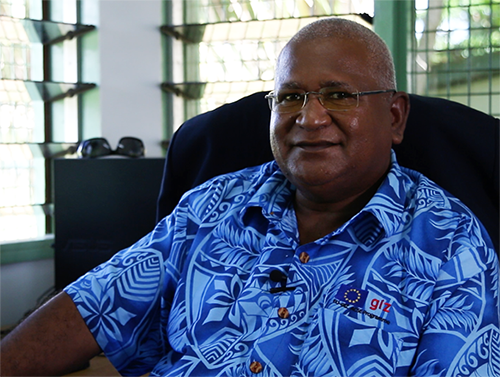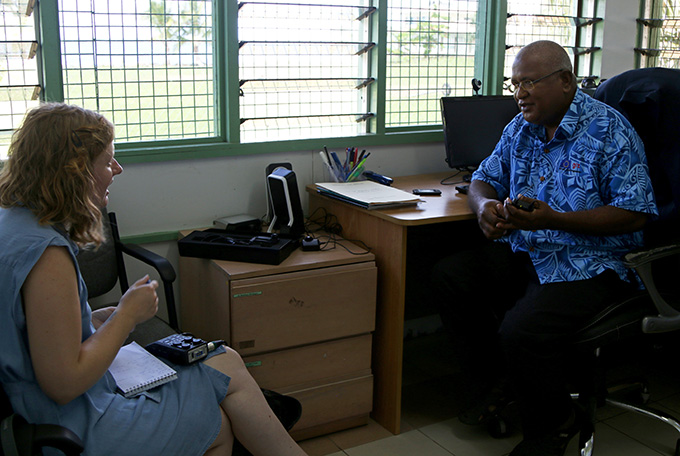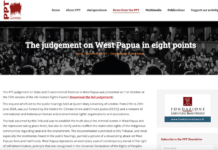Dr Morgan Wairiu speaking in a clip from the Asia Pacific Report interview. Video: PMC
Report by Kendall Hutt and video by Julie Cleaver in Suva
The commitment of more than 190 nations to reducing global emissions will continue to be addressed following a special climate change report which seeks to advise how countries can further cut emissions.
 Dr Morgan Wairiu, an expert in food security and climate change with the University of the South Pacific’s Pacific Centre for Environment and Sustainable Development (PaCE-SD), says the report will enable countries to further their efforts in keeping the global average temperature below 1.5°C.
Dr Morgan Wairiu, an expert in food security and climate change with the University of the South Pacific’s Pacific Centre for Environment and Sustainable Development (PaCE-SD), says the report will enable countries to further their efforts in keeping the global average temperature below 1.5°C.

“This is an assessment report, looking at all the work that has been done, research into the global average temperature 1.5°C, and see whether this is feasible, whether we can achieve that as agreed under the Paris Agreement.”
Dr Wairiu, a Solomon Islander who is one of only two Pacific Islanders working on the report, said that if current aggregate emissions reductions by countries under their Intended Nationally Determined Contributions (INDCs) would see the global average temperature on track for 2.7°C, which would have real-world effects on Pacific Island countries that were on the frontline of climate change.
“For Pacific Island countries, because of our vulnerable ecosystems, we can manage up to 1.5°C, but beyond that we’re going to start losing our ecosystems and livelihood, our resources, and then the survival of our people.”
Commissioned by the UN Framework Convention on Climate Change (UNFCCC) following the Paris Agreement in late December 2015, the Intergovernmental Panel on Climate Change’s (IPCC) 1.5°C report seeks to avoid such negative outcomes.
Dr Wairiu said this was because data collected by the 86 authors of the IPCC Special Report on 1.5°C would allow countries to “take stock” of their current emissions targets.
When this report is released in 2018, it will help countries decide on how to cut back emissions.
Reduction pledges
By 2025, the US has pledged to reduce emissions from 26 percent to 28 percent relative to 2005 levels.
China, on the other hand, says it will lower its emissions by 60 to 65 percent, but only after reaching maximum carbon emissions by 2030.
The European Union, meanwhile, aims to cut back emissions by at least 40 percent relative to 1990 levels.
The issue noted by many observers is that these intended targets put forward by nations prior to the Paris Agreement are up to each individual country to implement and force.
If these are not honoured or increased, scientists have warned the world will surpass the threshold in which global warming is reversible. The results of which will be catastrophic, observers believe.
Heat waves are predicted to last a third longer, rain storms would be about a third more intense, sea level will continue to rise, and tropical reefs would continue to degrade, a study by the European Geosciences Union revealed in 2016.
Loss of more atolls
The implications for human life of a warmer planet mean already vulnerable communities who live close to sources of water will face more flooding and drought.
For the Pacific, this means the loss of more atolls to sea level rise, salt water intrusion to fresh water supplies and staple crops, and the forced migration of Pacific Islanders.
“Some countries will disappear from the face of the world,” Dr Wairiu said.
He said a 1.5°C global average temperature was the threshold in which Pacific Islands would be able to survive, therefore. Beyond that, the future was relatively unknown.

The report is important for the Pacific, Dr Wairiu acknowledges.
“It’s very important because this is a call from Pacific Island countries. You know, they formed this coalition around the legal setting of 1.5°C during the Paris COP meeting, which is part of the Paris Agreement.
“This particular report will inform Pacific Island countries whether achieving 1.5°C is feasible or not. We’ll still be making very important decisions based on this report.”
Julie Cleaver and Kendall Hutt are in Fiji for the Bearing Witness project. A collaborative venture between the University of the South Pacific’s journalism programme, the Pacific Centre for the Environment and Sustainable Development (PaCE-SD), the Auckland University of Technology’s Pacific Media Centre and documentary collective Te Ara Motuhenga, Bearing Witness seeks to provide an alternative framing of climate change, focusing on resilience and human rights.















































